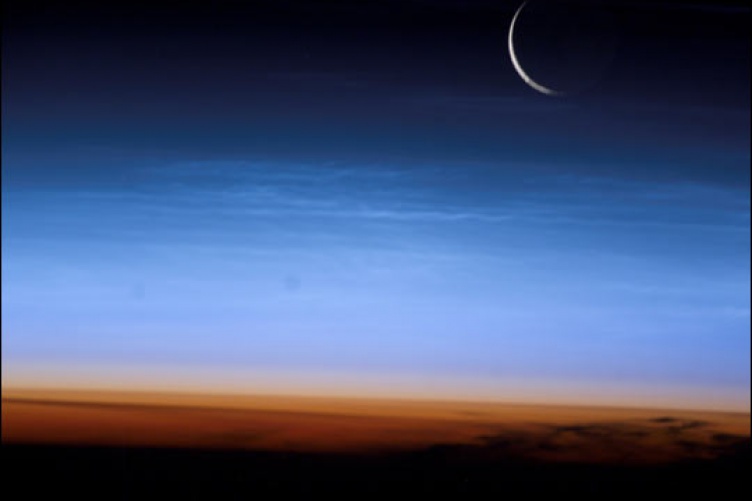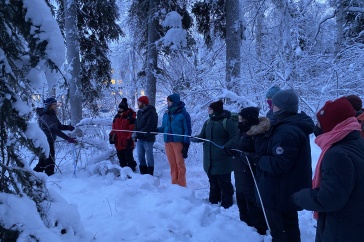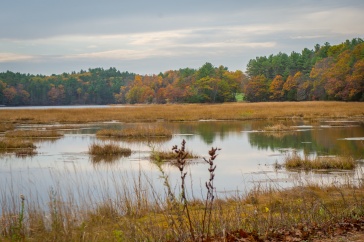
Image by NASA/JSC.
Professor Robert Harriss, an influential figure in the early growth of the UNH Institute for the Study of Earth, Oceans, and Space (EOS), passed away on Dec. 24, 2021 at his home in Boulder, Colorado. He was 80 years old.
Harriss earned his Ph.D. in geochemistry in 1965 from Rice University and moved on to become a faculty member at McMaster University in Ontario, then worked as a senior scientist at NASA’s Langley Research Center. He joined UNH in 1988 as a professor in EOS and the department of Earth sciences. During his time at UNH, he contributed to the rapid expansion of what was then the Complex Systems Research Center, now the Earth Systems Research Center, in the years surrounding 1990.
While at Langley and UNH, Harriss was a key organizer of several NASA field campaigns that used aircraft, tower-based and ground-based measurements to quantify key processes affecting the chemistry of the atmospheric boundary layer and trace gas exchange between the land surface and the atmosphere.
"Bob Harriss was a brilliant and committed scientist,” says Berrien Moore III, a former director for EOS who made the decision to hire Harriss during that time period and who now serves as the dean of the College of Atmospheric and Geographic Sciences at the University of Oklahoma. “However, even his brilliance was overshadowed by his genuine kindness and devotion to family and the planet. I never met anyone quite like Bob; his quiet strength left me in awe, and it also gave me strength to carry on no matter the setbacks or steepness of the mountain. I sense this now; he is still with me as he is still with all that knew him."
Harriss left UNH in 1994 but showed no signs of slowing down in his career; he later held positions as the director of the science division of NASA’s Office of Mission to Planet Earth, director of the Environmental and Societal Impacts Group at the National Center for Atmospheric Research, and president of the Houston Advanced Research Center. Even after retiring from this last position, Harriss served as a lead senior scientist at the Environmental Defense Fund, contributing to their Methane SAT Project — a mission scheduled for launch this year that will provide global, high-resolution coverage of methane emissions from oil and gas facilities.
During the course of his career, Harriss was awarded the NASA Exceptional Scientific Achievement Award in 1985 and the NASA Outstanding Leadership Medal in 1997. He was also elected a Fellow of the American Association for the Advancement of Science in 1988.
Among his many legacies, Harriss had a major impact on graduate students in EOS, who worked with him on a wide range of research projects. Here are memories from several of them:
Antonio Donato Nobre, a retired senior scientist at the Brazilian Institute of Space Research, came from Brazil to study tropical forest biogeochemistry with Harriss at UNH: “Harriss was much more than a wise and respected teacher and activist, which he certainly was. He opened the doors of wonder and marvel to all of us who were fortunate enough to be his students. His enchanting narrative made us see this miraculous planet as if we were astronauts gazing at the shining orb while floating in space."
Greg Norris, director for the Sustainability and Health Initiative for NetPositive Enterprise at MIT, came to study natural resources with Harriss at UNH: “His door was always open to us, his students and mentees, no matter how busy he truly was. His love of learning and of science and his absolute intellectual integrity were always on vivid display and in charge. He somehow combined a pure love of truth with an activist passion, and he radiated a genuine, heartfelt respect for all people and a love of life.”
Steve Frolking, UNH research professor of Earth systems science, switched fields from physics to study biogeochemistry with Harriss during graduate school: “Bob was an exceptional scientist and person, and a major influence on my life and career — helping me establishing connections that turned into lifetime collaborations with excellent researchers; teaching me by example that everything is interesting, and that the most important thing was to do good science, whatever the topic; and emphasizing that science had an important role in making the world a better place for all.”
Ruth Varner, UNH professor of Earth sciences, served as a teaching assistant for Harriss in the last year of her M.S. degree in Earth sciences: “I met Bob at a critical point in my career. After serving as his TA in my last semester of my M.S. degree in 1993, he hired me to do research on methane in landfills. This led me to the Trace Gas Biogeochemistry Group and ultimately launched my research career. I credit Bob for seeing something in me that I did not. I know I would not be the researcher or mentor I am today without his kindness, support and wisdom.”
As Nobre puts it, "Bob prepared and inspired us to go out into the field and fight for everything that is alive and for everything that is good and right.”
-
Written By:
Rebecca Irelan | Institute for the Study of Earth, Oceans, and Space | rebecca.irelan@unh.edu | 603-862-0990



















































